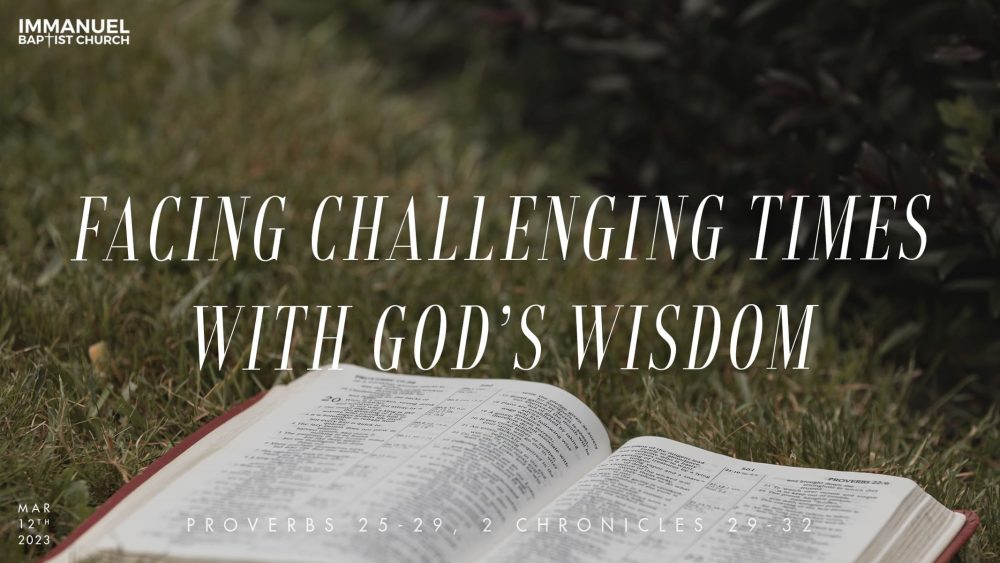Loading Content...
Share a Link to this Message
The link has been copied to your clipboard; paste it anywhere you would like to share it.
CloseDr. David Carey Dixon - October 15, 2023
If the Foundations Are Destroyed, What Can the Righteous Do? (Luke 11:-14-28)

How do we carry the burden of other people’s tragedies, empathize without being overwhelmed, persevere in caring for the weary and wounded (even when your own wounds may be festering)? What do we do when the attempt to empathize and help others carry their burdens wears us down? What comeback do we have when the enemy confronts us with the claim that the foundations are being destroyed – and the world situation seems to bear it out – and the conclusion seems logical that there’s nothing to be done but shrug our shoulders and fall into mere “survival mode”? How does a Christian respond to a world that seems determined to destroy us all? How do we keep our sanity in the midst of so much chaos going on all around us? Compassion fatigue is a term that describes the physical, emotional, and psychological impact of helping others (often through experiences of stress or trauma), without adequate breaks or support. Our world’s many hotspots of violence, terrorism, war, starvation, and other human tragedies can quickly bring us to the border of compassion collapse. One prominent psychologist tells us that trauma victims will be the new missions frontier of the 21 st century (Diane Langberg). How do we keep our sanity in the midst of so much chaos going on in our world right now? There has to be a reference point for it that’s much bigger than we are. In Ps. 11, the answer to the question about what can the righteous do seems to be that there’s nothing to be done; the cause is hopeless; we may as well give up and just focus on self. But the psalmist’s answer is about affirming the truth of God’s sovereignty: He’s on His throne, in His holy temple; no matter how disastrous the outlook, He sees, He tests the children of Adam, He examines the righteous, but He despises the wicked and their violence; they will not ultimately triumph.
Scripture References: Luke 11:14-28
Related Topics: Burden, Luke 11:14-28, Suffering, Tragedies | More Messages from Dr. David Carey Dixon | Download Audio
From Series: "Sunday Service"
More From "Sunday Service"

January 15, 2023
Letting God’s Word Get a Deeper Grip on my Soul (Mt. 22:23-33, Heb. 4:12-13)
David Carey Dixon
Matthew 22:23-33, Hebrews 4:12-13

January 22, 2023
Maturity Comes at a Price! (2 Corinthians 12:1-10)
Dr. Tom Riley
2 Corinthians 12:1

January 29, 2023
Growing in the Discipline of the Cross (Mt. 16:13-20, 21-28; Gal. 2:20)
David Carey Dixon
Galatians 2:20, Matthew 16:13-28

February 5, 2023
Maturing in the Steps of our High Priest (Hebrews 4:14-16, 5:1-14, 6:1-3)
David Carey Dixon
Hebrews 6:1-3, Hebrews 5:1-14, Hebrews 4:14-16

February 12, 2023
Love Divine, All Loves Excelling (Philippians 2:1-11)
Timothy Eric Bermejo
Philippians 2:1-11

February 19, 2023
Maturing in the Body of Christ (Ephesians 4:11-16, Psalm 80)
David Carey Dixon
Psalms 80:1-19, Ephesians 4:11-16

March 5, 2023
Do You Please God? (Hebrews 13:1-16)
Bro. Kevin García Recío
Hebrews 13:1-16

March 12, 2023
Facing Challenging Times with God's Wisdom (Prov. 25, 2 Chron. 29-32)
David Carey Dixon
Psalms 19:7-14

March 19, 2023
Maturity in our Gratitude (Philippians 4:10-20)
Larry McCrary
Philippians 4:10-20
